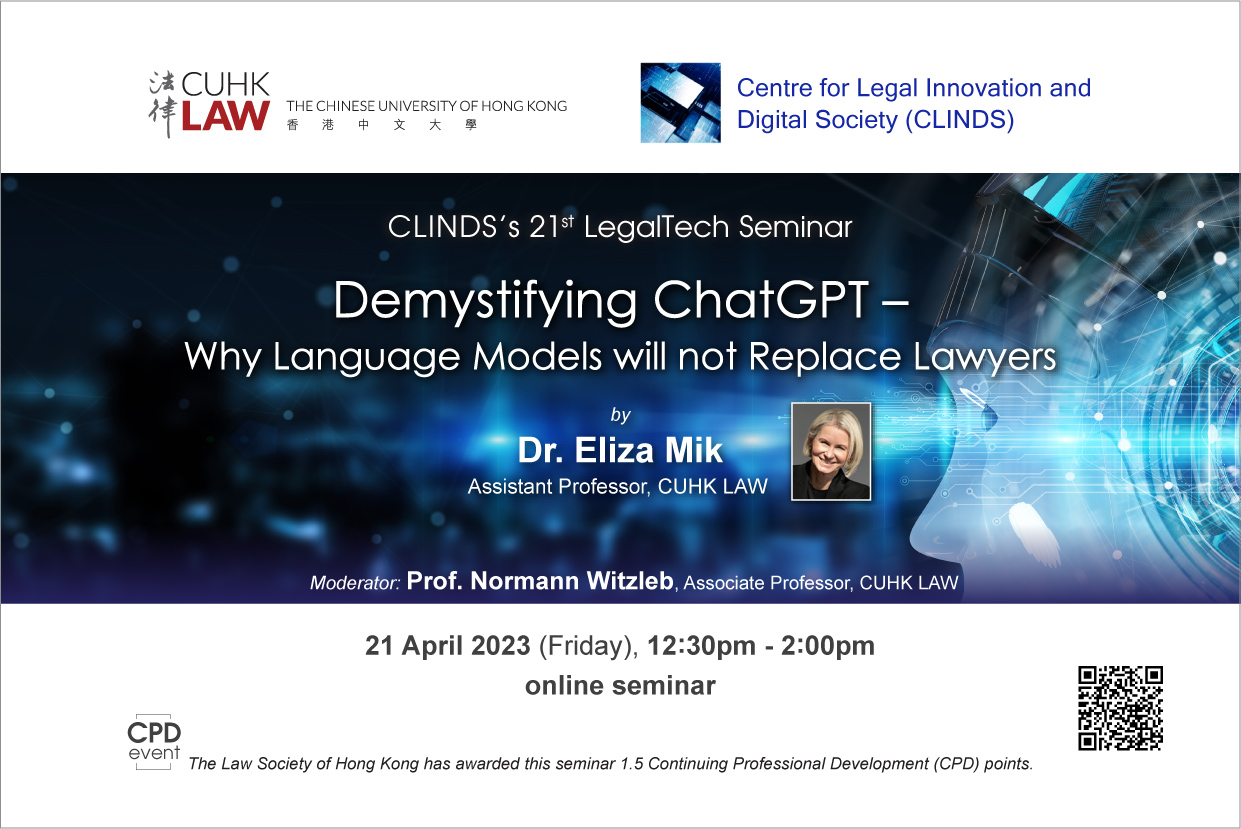活動
CUHK LAW CLINDS’s 21st LegalTech Seminar – ‘Demystifying ChatGPT – Why Language Models will not Replace Lawyers’ by Dr. Eliza Mik (Online)
2023年4月21日
12:30 pm – 2:00 pm
Online (Zoom)
Dr. Eliza Mik teaches Legal Technologies, E-Commerce Law and Contract Law at the Faculty of Law, Chinese University of Hong Kong. Her research interests focus on the legal aspects of transaction automation. Before joining academia, she worked in-house for a number of software and telecommunications companies in Australia, Poland, Malaysia and the United Arab Emirates, advising on technology procurement and e-commerce regulation. Eliza has also advised the World Bank and the Monetary Authority of Singapore. At present, she is a member of the UNCITRAL Expert Group for the Digital Economy, a member of the Inclusive Global Legal Innovation Platform on ODR (Hong Kong), a Research Associate at the Tilburg Institute for Law, Society and Technology and an Affiliate Researcher with the Centre for AI and Digital Ethics at the University of Melbourne. She currently leads two research projects, one on the feasibility of data-driven approaches in LegalTech and one on the legal responses to smart contracts.
The rise of large language models, most notably OpenAI’s ChatGPT, has revived fears of humans being replaced by AI, especially in those professions that involve the generation of text. While is true that some large language models, or “LLMs,” can create plausible and well-structured sentences that are difficult to distinguish from human output, claims that they could endanger the legal profession must be approached with skepticism. Leaving aside sensationalistic headlines, it is necessary to take an in-depth look at the actual technology underpinning LLMs and to acknowledge their limitations. LLMs have one objective: to predict the next word based on a fixed number of previous words (typically a few hundred). Learning statistical regularities to model the probabilities of various syntactic phenomena, does not translate into problem solving or reasoning. LLMs are trained to extract statistical information about words, not facts about the world – not to mention legal knowledge. At present, despite their impressive performance in text generation, no single language model can solve problems that require commonsense reasoning and/or context awareness. The seminar will explain how LLMs are created (trained) and to what extent, if any, their answers can be trusted. One a broader level, the seminar will discuss the relevance of data-driven approaches to the facilitation of legal tasks.
The following questions are addressed:
- How does ChatGPT actually work? What are its capabilities? What are its limits?
- What can ChatGPT and other language models be actually used for in legal practice?
- What are the problems surrounding the potential adoption of LLMs in legal practice?
- Can we expect ChatGPT to “scale up” and develop reasoning skills?
Language: English
The Law Society of Hong Kong has awarded this seminar 1.5 Continuing Professional Development (CPD) points.


